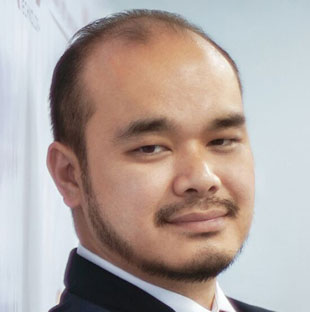
Dr Gabriel Walter
KUCHING: Dr Gabriel Walter knows a thing or two about living in a remote area with limited access to things the average urbanite today takes for granted.
The group chief executive officer (CEO) of Quantum Electro Opto Systems (QEOS) Sdn Bhd is a Kelabit from Bario. He now leads a company that strives to connect people, power and data.
Recently here, his current focus is on rural area development, specifically on electrification programmes — a matter close to his heart.
“You can see what the government is trying to do there, and one of the most important needs for electricity is for lighting,” he said, adding that about 80 per cent of the energy used in rural areas is on lighting, which amounts to four or five hours on a diesel generator at night.
Gabriel, who earned his doctorate in electrical engineering from the University of Illinois-Urbana Champaign (UIUC), pointed out that reducing the power consumption for lighting would benefit the rural area. His company, QEOS, has solutions that stakeholders need to know about.
“I don’t know if we will get jobs here. There are so many aspects that determine whether or not someone gets to do business. But we want to create awareness that technology has come to this certain point and are affordable.”
For example, household staples such as television have long been dominated by foreign brands all hawking their wares here at a princely sum, with big screens that can cost up to RM20,000.
The same brands and models are cheaper in the United States, but they are region locked. They don’t work when shipped to Malaysia, as Gabriel discovered upon returning to the country two years ago.
He pointed out these companies were cornering the market here and colluding on the price.
“We look at inefficiencies in the market, and we target our solutions there. We can offer big screen LED (light emitting diode) television with better performance at more affordable prices,” he said, adding that the RM6,000 QEOS system would get you the same size as a RM20,000 foreign brand.
“There is market distortion. People are not aware that TVs are simple things, yet people are selling them at a premium.”
This market distortion is also evident in the lighting industry, for example with LED lighting.
“Everybody knows the LED lighting is very efficient, but how come it’s not widely used everywhere? The problem comes from lack of awareness. People use LED. But when it starts breaking down, it looks so unreliable. And they’re expensive, too. If it was unreliable, it won’t be one of the fastest growing industries in the world. It’s just in Malaysia that it’s unreliable.”
Gabriel explained that the LED lighting tubes sold in America comes with a 10-year warranty. In Malaysia, the same brand gets a two-year warranty.
“People don’t understand there are so many different models.”
He also spoke at length about solar energy and how millions were being pumped into something that was designed to last merely five years.
“They just installed a 600 kilowatt system in Bario at a cost of RM60 million — a huge figure. It’s going to last five years (performance). The warranty is only two years,” he said, registering his concern about how the community would depend on this source of electricity, and then the system would die.
“Then what? Is it time to beg the government for another RM30 million to fix the battery system, or else we won’t vote for you? Are we always going to be in this situation?”
He said the government did try to help, but they were not aware that these systems could last 25 years for the same price.
“That’s what we’re trying to promote with our system—affordable performance. We want this out there in the public so that when someone goes propose something to the government, they can say, ‘Why can’t you do something like QEOS?’”
Gabriel could not care less if they did not land the project, as long as people understood that they could demand better value for their money.
“We cannot expect funding to last forever, that we’ll always have money pouring in for rural electrification. Five years from now, are we still going to be in the same financial situation where we can continue pumping money into the rural areas?”
He went on to emphasise that QEOS was not there to pick fights with other TV or lighting brands, because they had their own grand design.
“We are a communications company. We are just structuring our company this way to make it easier to understand. Everyone knows what TVs, lighting and solar energy are.”
In the end, all these things could be upgraded and communicate between each other, he said.
“This is the Internet of things, a crucial part of the digital enterprise. Whenever we transmit data, we want to see the data right here, right now. When we talk about the Internet of things, everything terminates in a display — phones, watches, TV. If you want to have a system that is data intensive, then you do not want your display to be expensive. That’s why we got into the display business. We are trying to sell entire systems.”
QEOS was founded in 2008 by three researchers from the University of Illinois Urbana-Champaign to pioneer the commercial development of high speed, low cost and power efficient fiber optics communication solutions based on the Tilted Charge Dynamics™ technology platform.
QEOS in East Malaysia can be reached at 012-8832399 (Colin) or at [email protected]. For more information on QEOS, visit www.qeosystems.com.
